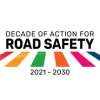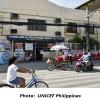Press Releases
Displaying Results 1 - 23 of 23
The Beirut port explosion in August 2020, caused by fire spreading across a storage area detonating a large amount of ammonium nitrate (AN), resulted in 300 deaths and 6,500 injuries, the displacement of about 300,000 people and severe damage to the port and city, including healthcare facilities
The launch of the Decade of Action for Road Safety 2021-2030 sets the ambitious target of preventing at least 50% of road traffic deaths and injuries by 2030. To realize this vision, UNECE partnered with WHO and its sister UN Regional Commissions to develop a Global Plan for the Decade of Action,
Habtamu Zerihun is a 38-year old father to three daughters, aged 4, 6 and 12 years. Habtamu used to be a construction worker in and around Addis Ababa, until he was hit by a pickup on his walk to work. The pickup driver was under the influence of stimulant drugs and there were no adequate
Despite decades of discussions on the challenges and intersections between gender and transport, progress has been slow in implementing a gender perspective in transport policies. This has been problematic, for example, in urban planning which fails to recognise the different travel patterns
Today, European countries adopted the Vienna Declaration to spur the transformation towards clean, safe, healthy and inclusive transport and mobility, with a strong focus on promoting cycling across the pan-European region.
The Vienna Declaration was signed at the end of the Fifth High-level
Recognizing the vital importance of mobility and connectivity for sustainable economic development and taking stock of key challenges, UNECE has consolidated its work in this cross-cutting area to help countries leverage its tools to steer recovery efforts towards the Sustainable Development Goals
Countries of the Pan-European region can seize the COVID-19 recovery as a turning point for green and healthy transport and mobility as a foundation to build a better future for all, urges a UN Task Force.
Bringing together over 50 experts from member States, international institutions, academia
The legal provisions providing the legal basis for the complete digitalization of the United Nations TIR Convention (the so-called eTIR) - the only global customs transit system, facilitating trade and the seamless and secure movement of goods across borders –will enter into force on 25 May 2021
Transport leaders from around the world have called for urgent and concerted action to address systemic vulnerabilities exposed by the COVID-19 pandemic, which caused widespread disruption to transport connectivity and supply chains. Gathering for the 83rd session of the UNECE Inland Transport
As the world enters in a new Decade of Action for Road Safety 2021-2030, the UN Road Safety Fund (UNRSF) announces the successful completion of two of pilot projects demonstrating the potential of targeted and coordinated action to save lives in low- and middle-income countries, where 90% of the 1.
The Transport, Health and Environment Pan-European Programme (THE PEP), jointly serviced by the UNECE and the WHO Regional Office for Europe, will hold its Fifth High-Level Meeting from 17 to 18 May 2021. The Fifth High-Level Meeting was due to be held in November 2020 in Vienna; however, due to
According to national statistics, road traffic deaths in Ethiopia more than doubled between 2007 and 2018, rising from 2,161 to 4,597. Ethiopia loses 13 people per day, or one person every two hours, to road traffic crashes. Given the magnitude of the road safety challenge, which constitutes a
Car sharing and carpooling are two of the most visible and rapidly evolving areas in the shift towards sustainable mobility and could support Central Asian countries’ sustainable post-pandemic recovery, according to a new UNECE study. Shared mobility initiatives can contribute to more efficient
In 2020, the World Day of Remembrance for Road Traffic Victims pays tribute to the dedicated efforts of emergency crews, police and medical professionals, who deal daily with the traumatic aftermath of road crashes. As we enter a new Decade of Action for Road Safety 2020-2021, there are
Enhancing connectivity and ensuring sustainable and efficient functioning of international transport corridors is of paramount importance for the economic recovery of landlocked countries of Central Asia and the Caucasus, especially during the COVID-19 crisis which caused serious disruptions of
The social and economic disruption of the COVID-19 pandemic is impacting our efforts to improve livelihoods and achieve the Sustainable Development Goals (SDGs). The early responses to restraining the spread of the COVID-19 pandemic negatively impacted all transport operations, leading to severe
The UN Road Safety Fund’s 2020 call for Proposals will be partially connected with the changing priorities of governments as a result of the Covid-19 pandemic with respect to building better and safer mobility. This was decided by the Fund’s Advisory Board at its fourth session last week. The
The COVID-19 pandemic is the defining global health crisis of our time. It is causing disruption and human suffering around the world. Its far-reaching social, economic and multidimensional impacts will be felt across all corners of the globe for some time to come. The measures to contain the
How will urban mobility change in the aftermath of COVID-19 lockdowns? In the short term, if passengers avoid public transport due to health fears, passenger car journeys could increase significantly, which would choke cities with traffic and pollution. Many cities have been reallocating space
During the lockdown, city- and town-dwellers enjoyed clear blue skies and clean bodies of water thanks to reductions in air pollution and began to hear birdsong owing to lower levels of noise pollution. Pollution levels in Barcelona, for instance, dropped by an estimated 62 per cent. Similar
It is clear that the recovery from the COVID-19 pandemic cannot simply be a return to business as usual. With the mobility that societies take for granted severely limited in many countries due to emergency measures, one area that calls for a critical re-assessment is how we can shift to more
A variety of products used or produced daily by hospitals need to be handled and transported with special care because they are infectious, hazardous or radioactive substances. The United Nations have developed Recommendations for the Transport of Dangerous Goods to ensure their safe and
International movement and connectivity are facing unprecedented challenges as an increasing number of countries around the world close their borders and impose travel restrictions in response to the COVID-19 pandemic. The patchwork of uncoordinated measures taken complicates compliance by













